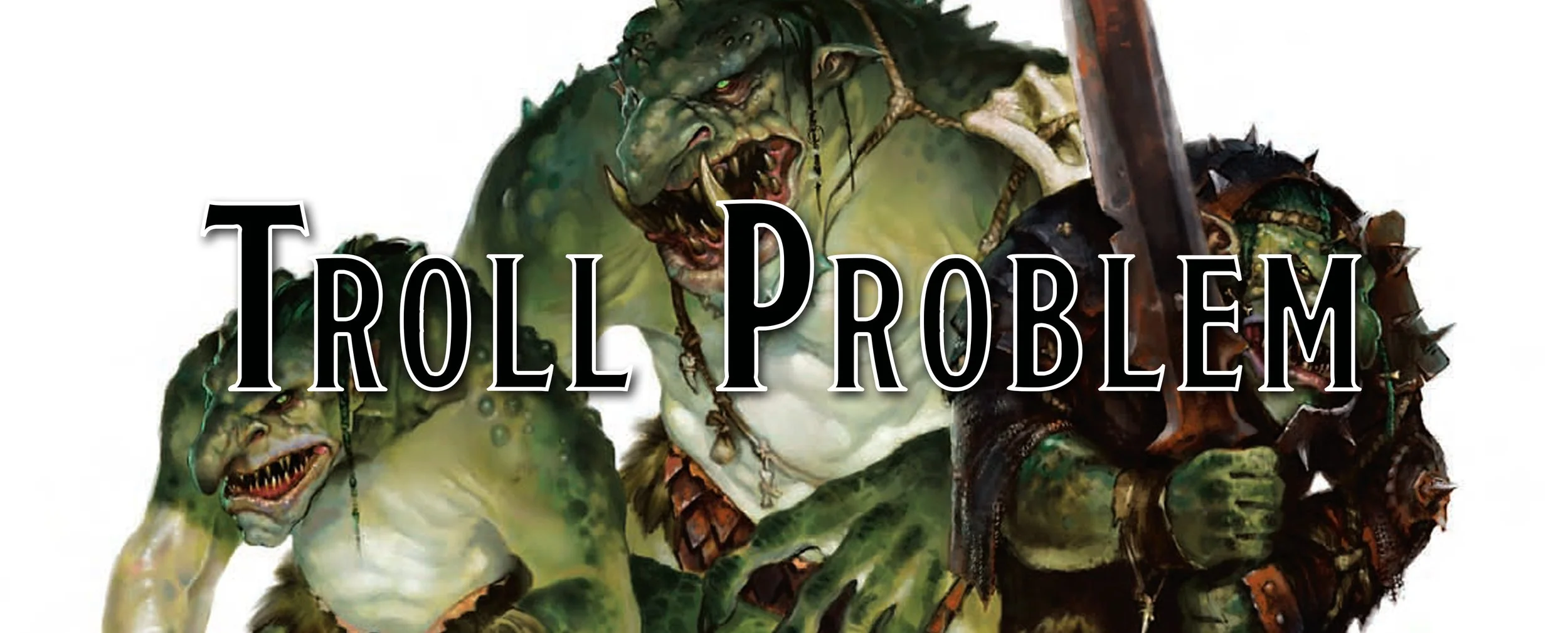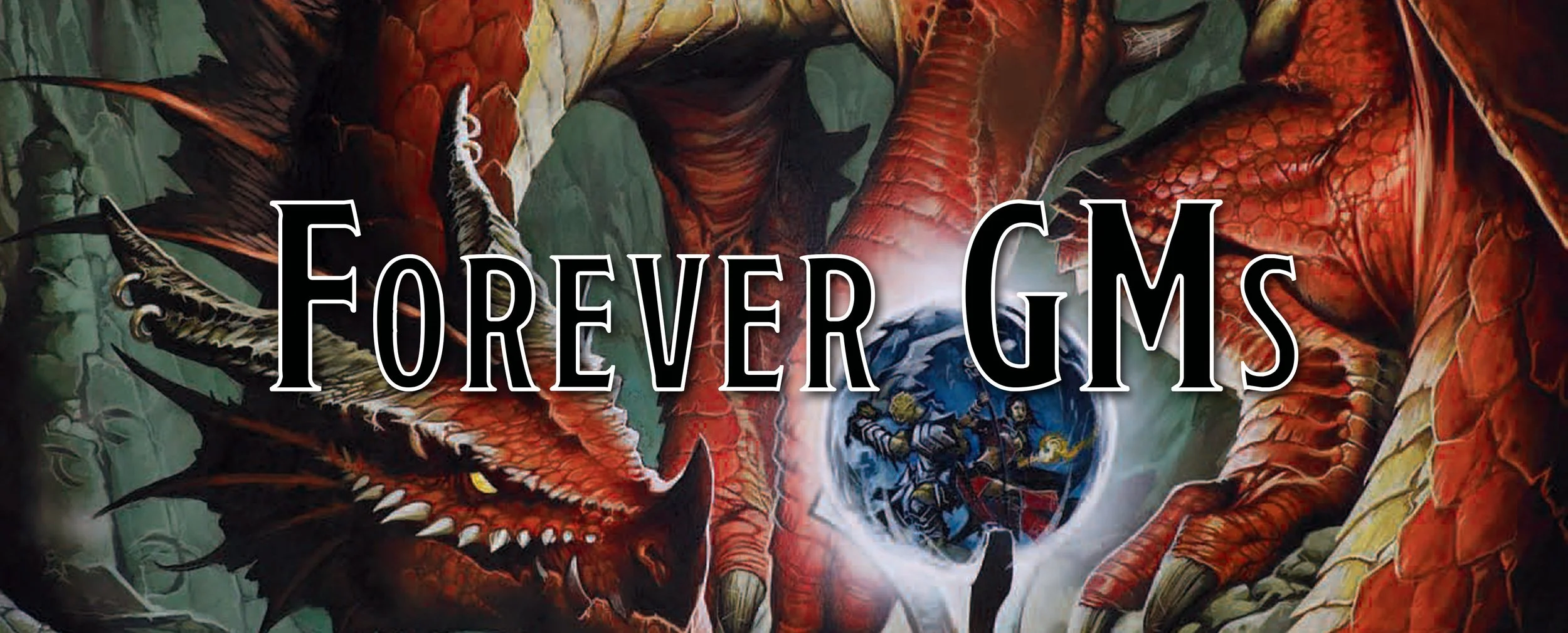The Troll Problem - Metagaming at the Table
There is a big problem for Tabletop Role-Playing Games that most other media doesn’t suffer from. You are supposed to be playing the role of a character, probably a low-level character without much experience in the world, and trying to be true to your character.
This hits a snag when your character first encounters a monster that they have never faced before, but you, as a player, have. This is what I am going to call the Troll Problem. Your character has never fought a troll, you have fought a troll (or know about them), you want to be a good player and not metagame, but you also know that that will make the fight a lot harder for your table.
Do you metagame? How do you justify to yourself (and the table) your metagaming behavior? Will the Game Master be upset or annoyed with you for metagaming? Does your character even know enough about the monster for you to hide behind the shield of “character knowledge”?
It’s a tricky problem that people have worked themselves into knots over.
What is Metagaming?
I’ve talked about metagaming before. It’s kind of inevitable for an RPG blogger to talk about metagaming. It’s probably one of those ‘most talked’ about topics because of how ubiquitous it is.
The bare basic definition of metagaming is using PLAYER knowledge when your CHARACTER wouldn’t have that knowledge.
The Troll Problem
A relevant example of such knowledge would be that trolls regenerate hit points every round. In order to turn that ability off, you must use acid or fire damage on them.
You are using your knowledge (that trolls regenerate and the only way to kill them is to use acid or fire damage) to defeat the troll. You aren’t using your character’s knowledge, whose background is that they are a soldier who fights with a shovel while wearing plate armor. Instead, you are using ‘outside’ knowledge that trivializes the encounter, allows you to ‘cheat’, or bypass a challenge, not with cleverness, but by exploiting your ‘outside’ knowledge that nobody else has (or is planning on you having, like in the case of the Game Master).
Metagaming in the World
We all want to be good players. It’s hard to do when you know something, and in any other media, you could act on it. No one bats an eye if you are playing Bloodborne and you’ve memorized monster locations, boss strategies, and researched builds to optimize your playthrough. No one cares if you are playing Stardew Valley and you looked up fishing rates and where to catch specific fish.
But when you act that way in a Tabletop Role-Playing Game, you now have people calling you a bad player. It isn’t considered ‘good’ for you to memorize the Monster Manual or read the Game Master’s notes so you can make sure you pick the best spells for the final boss fight.
It’s similar to code-switching where you swap between different languages or ways of speaking depending on who you are talking to. You might talk to your gamer friends in an expletive-laden diatribe, but while at work, you keep your tone and words very professional. You swap back and forth between these two modes of talking depending on the setting you are in. The same way that you might look up guides to beat the final boss of Paper Mario and then do everything in your power to ‘act’ like you have no idea how to kill a troll.
We switch between modes of play depending on the media. You might be a hardcore World of Warcraft player using bots to determine that one piece of armor increases your damage by .01% over a month of play, but when you go to play Dungeons & Dragons, you ‘forget’ that most plant-type creatures are vulnerable to fire so that you aren’t labeled as a ‘metagamer’.
The World Is Alive
But I am here to help relieve a part of this problem. People exist in the world that the Game Master has created. These people tell stories with each other, and these stories are going to be about the important things in the world.
You can look at our own stories and myths. Vampires aren’t real, but I bet anyone you meet on the sidewalk knows that sunlight, garlic, and a wooden stake in the heart are all you need to make Dracula a goner. Or that the only way to defeat a zombie is to give it a boop on the head. Or that King Kong is vulnerable to being knocked off a skyscraper with biplanes.
These stories we all know are about entirely fictitious things that have no relevance in our lives, yet we know what to do when the zombie uprising comes. Go to the Winchester, have a nice cold pint, and wait for this all to blow over.
The World’s Stories
So let’s talk about what your character would actually know. They probably go to bars and taverns an unhealthy amount over the course of their adventuring career. They talk to other adventurers, listen to bards recounting stories, and ask sages for advice on dealing with monsters.
Just because those events aren’t talked about at the table, doesn’t mean that they don’t happen. If you, the player, know that a troll needs to get hit with an acid flask or a torch, why can’t your adventurer know that too? Common monsters and the tactics used to survive them are going to be widespread in a world where learning those stories decides whether the villagers survive or die when a troll takes up the occupation of ‘tax-collector’ on the nearby bridge.
And just like those stories, your adventurer may hear stories that aren’t real. Perhaps you misremembered the thing about flesh golems and fire, not realizing that fire is kind of bad to use around them since it turns them into a frenzied berserker. Or that vampires aren’t actually susceptible to garlic in Dungeons & Dragons and you aren’t going to defeat Strahd with a club made out of garlic bulbs and the bones of a saint.
Solving the Troll Problem
There isn’t a single way to solve the Troll Problem. The solution is complicated, and it is going to be different for every case, every table, and every Game Master.
You could grant advantage or bonuses to characters when they attempt to recall knowledge on common creatures and their abilities.
You could let players use their metaknowledge and justify it in the world by having the characters ‘recall’ stories they overheard in a tavern.
Then again, you might swap out abilities and change the mechanics of monsters so that no one knows how or what they are fighting.
Those are three options - and they won’t work for every situation that arises. Ultimately, it comes down to the Game Master, the monster in question, and the player. Not everyone is going to know that liches have a corrupting touch, but everyone might know that getting bit by a werewolf is a very bad idea. Where you draw the line between ‘common’, ‘uncommon’, ‘rare’, and ‘esoteric’ knowledge is largely going to be up to your world, how much influence monsters and magic have in it, as well as how much metaknowledge you and your players have about the game.
Header Art: Monster Manual (2008) by Wizards of the Coast
Like what we are doing here?
Support us on Patreon!
You’ll get early access to deep dives, our Homebrew Hoard,
monster stat blocks and more!
Follow us on Twitter to keep up to date on everything we talk about!



